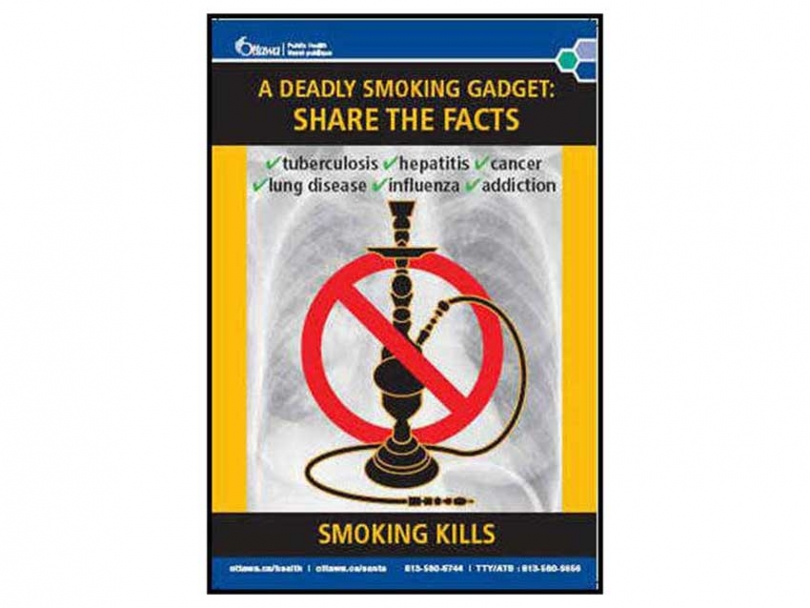
Apr
With spring in the air, many are turning to outdoor patios to enjoy good times with friends, food and sunshine. In this mix however, is the unfortunate rush to include shisha.
Of course, one need not wait till the spring; many have access to shisha (aka hooka, narghile) throughout the year thanks to local outlets. It is not uncommon to see families smoke together, with bearded men and hijab-wearing women among them.
All are under the impression that this odious practice is far less harmful than smoking cigarettes because the (scientifically baseless) assumption is that tobacco-free shisha is 100 per cent harmless. But our youth in their rush to be cool, and our adults in their carrying on of tradition, are unwittingly engaging in a practice that is both physically and spiritually harmful. Take a look for yourself at the facts about shisha smoking:
Many scholars agree that wilful inhalation of smoke is haram ”“ whether it comes from a cigarette, a water pipe, or the like. The reason is that the smoke ”“ whatever its source ”“ is filled with toxins, poisons, and cancer-causing agents.
Our body is a trust from Allah (Glory be to Him in the Highest), and we will be answerable for how we treated it. The scholars remind us of the following Quranic injunctions:
“And do not kill yourselves. Surely, AllÄh is Most Merciful to you. And whoever commits that through aggression and injustice, We shall cast him into the Fire and that is easy for Allah.” (Quran 4:29)
“And do not throw yourselves into destruction.” (Quran 2:195)
Myth: Shisha is less harmful than cigarettes
Some people believe that shisha is safer than cigarettes since the smoke passes through water before being inhaled.
In 2012, The American Cancer Society stated:
“Hookahs are marketed as being a safe alternative to cigarettes. This claim is false. The water does not filter out many of the toxins. In fact, hookah smoke has been shown to contain concentrations of toxins, such as carbon monoxide, nicotine, “tar,” and heavy metals, that are as high or higher than are seen with cigarette smoke. Several types of cancer, including lung cancer, have been linked to hookah smoking. Hookah is also linked to other unique risks not associated with cigarette smoking. For example, infectious diseases including tuberculosis (which can infect the lungs or other parts of the body), aspergillus (a fungus that can cause serious lung infections), and helicobacter (which can cause stomach ulcers) may be spread by sharing the pipe or through the way the tobacco is prepared.”
In addition, shisha leads to low birth weight babies by pregnant women who smoke. These facts have been reiterated by the World Health Organization.
Myth: Non-tobacco shisha is completely safe
Some people believe that since non-tobacco shisha does not contain any nicotine or tar, it is completely safe to smoke. This is false. A recent finding from Columbia University states:
“Hookah smoking has its own demon ”” combusted charcoal ”” which carries health risks even when non-tobacco shisha is used.
When charcoal is burned to create the hookah effect, it releases chemicals in the process, namely carbon monoxide (CO) and polyaromatic hydrocarbons (PAH). In addition to inhaling by-products of the shisha, water pipe smokers also inhale fairly large quantities of these combustion-related toxins ”” a hidden health risk associated with hookah smoking, even for non-tobacco shisha.
One recent study found that in a typical hookah smoking session, participants inhaled more carbon monoxide than someone who smokes a pack or more a day of conventional cigarettes.
While it is true that you aren't inhaling tobacco smoke, the sustained burning of the charcoal carries the risk of extended exposure to CO and PAH. Even at low levels of exposure, both CO and PAH have corrosive and carcinogenic [i.e. cancer-causing] properties.”
Conclusion
Contrary to popular opinion amongst Muslims, shisha, narghile, hooka are quite harmful to one's health, whether one uses non-tobacco products or not.
Allah (Glory be to Him in the Highest) has provided every one of us with an intellect to discern with, and a conscience to decide between what is wrong and right. Take the time to make an informed choice.
In Muslim Link's May Issue, we will be exploring Ottawa's Shisha Scene, speaking with Muslim business owners and shisha smokers about why, despite the risks, shisha is becoming so popular. The reasons are more complex and complicated than you might think.
This article was produced exclusively for Muslim Link and should not be copied without prior permission from the site. For permission, please write to info@muslimlink.ca.









